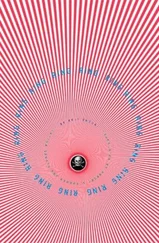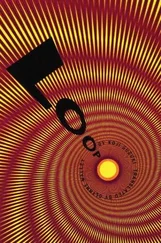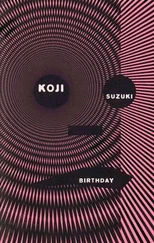Saeko didn’t relish traveling all the way to Ina next to this woman. She couldn’t relax; the old woman gave her goose bumps. It was as if Shigeko Torii’s entire body radiated some sort of unique energy.
Saeko found herself wondering if the assistant director had deliberately chosen to travel economy class. When a television crew traveled by train to cover a story, it was customary for the talent to travel business class while the rest of the staff rode in economy. As a collaborator on the project, it would have made sense for Saeko to travel economy too, but for some reason Sakai had bought her a business-class seat. Perhaps Shigeko Torii had asked him to. Perhaps she’d wanted someone to talk with, and Sakai had offered up Saeko as a human sacrifice.
Torii looked up from the business card and looked into Saeko’s eyes, first one and then the other. She exhaled sharply through her nose and retrieved her bag from the floor, setting it atop her knees.
“It must be very hard for you, all alone.”
The comment was cryptic, but it made Saeko gasp. It was as if the old woman had used Saeko’s card as a window to peer into her heart.
Biting solitude … The summer eighteen years ago when Saeko’s life had changed forever …
Or was it just a lucky guess?
In either case, Saeko didn’t appreciate having her past dredged up. The thought of enduring two hours of unsolicited mind-reading made her shudder. And even though she was exhausted from her all-nighter, she could hardly abandon the old lady to take a nap.
Saeko foundered, uncertain of how to respond. Meanwhile, Torii extracted a travel cup of sake from her purse and opened the lid. She slurped it loudly, and the scent of sake filled the air. Immediately, the old woman’s fingers stopped shaking. It was DTs after all.
“Would you like some?” Torii offered Saeko the cup she’d just sipped from.
“No, thank you. I don’t drink.”
“Liar,” Torii shot back with a mischievous smile.
It was true. Saeko did drink. In fact, for a woman, she had a fairly high tolerance. Lately, she couldn’t sleep at night without a drink.
Once again, Saeko was at a loss for words, and she felt her body grow stiffer. She wanted to diffuse the tension somehow but was unsure of how to begin.
True to her profession, Saeko had done her homework on Shigeko Torii as soon as she’d learned that the psychic would be involved in the project. Born in 1944—a moment ago, Saeko had perceived the old lady to be over eighty, but in fact she was sixty-eight.
Torii was fifty when she’d risen to prominence as a psychic, a year after she’d acquired her powers through a painful event. She had witnessed the tragic death of her only child — a son who had been born to her at the somewhat late age of thirty-eight — in an accident at a railway crossing.
Torii and her son, who had just turned ten at the time, were both on bicycles at a railway crossing in their local shopping district. Just as they were crossing the tracks, the chimes rang to announce that a train was on its way. Torii was certain that her son was following her; she could hear him behind her on his bicycle, she later said. But as the boy scrambled to keep up with his mother, the wheel of his bicycle slid on the tracks and he fell off.
When Torii noticed there was nobody behind her, she doubled back towards the tracks just as a red train whizzed past. Right before her eyes, all four of the boy’s limbs were torn from his body and launched through the air. Torii let out a piercing shriek as she witnessed her son’s instant death.
A witness later testified that Torii’s scream hadn’t been that of a human being. Kwaah! The piercing, sharp cry had echoed forth and seemed to rise up into the heavens, skewering a fast-moving cloud on its way.
Foaming at the mouth, Torii had fallen to her knees on the asphalt. She lost consciousness and was transported to the hospital, where she awakened three days later.
It was then that Torii’s hair turned white and fell out in clumps. She also took to drinking each day from morning until night.
After the funeral, Torii insisted that her son was still near and refused to acknowledge his death no matter what her family said. She could still hear his voice. If only everyone else could hear it too, they would believe her, Torii decided. So she consulted with an itako of Mt. Osore — blind female shamans reputed to have the power to commune with the dead. Much to Torii’s surprise, when she reached Mt. Osore, the itako informed her that Torii herself had come into possession of unusual powers. She could see into a person’s past merely by touching an object that belonged to them.
It didn’t take long for word of her powers to spread. Disbelievingly, the director of a TV station approached Torii for an interview and brought with him an old pair of glasses. Torii touched the frames lightly before responding with three impressions of their owner.
The glasses had belonged to an elderly woman who was now dead. The woman had done work related to Noh or Kyogen theater. She had undergone cataract surgery once and had been wearing the glasses when she died.
All three conjectures were right on the mark. The glasses had belonged to the director’s late grandmother to whom he had been very close. A year earlier, she had suffered a heart attack at home in her bathroom, and by the time help reached her it had been too late. She died in the ambulance on the way to the hospital, still wearing her glasses. Her husband was a critic of the traditional Japanese theater arts, and she had often attended performances with him and aided him in reviewing Noh and Kyogen performances. Finally, she had undergone an operation once for cataracts.
The first statement about the owner being an older woman who had already passed away could have been a lucky guess based on the old-fashioned style of the glasses and their convex bifocal lenses. But it was hard to explain how she might possibly have assessed the other two points. In particular, the part about doing work related to Noh or Kyogen theater seemed like such an unlikely idea for someone to come up with on the fly that the director came away quite strongly convinced of Torii’s psychic abilities.
The encounter led to Torii’s first television appearance, in which she performed similarly accurate readings. The show involved audience participation, Torii revealing audience members’ pasts based on personal objects they provided.
More than anything, her reputation was cemented when she gave a reading on the perpetrator of an unsolved murder case, who went on to turn himself in. Based on a hat found at the crime scene, Torii had described the owner’s job, age, and place of residence so accurately that the murderer, who happened to be watching the show, gave himself up to the police in fear.
These mysterious powers seemed to derive from the psychological blow Torii experienced when she witnessed her son’s death.
As the old woman sipped her cup of sake, her sight wandered across the floor vacantly. Her eyelids drooped, but the rapid movements of her pupils betrayed fluid mental processes in spite of her sluggish outward appearance.
As Saeko reflected on Shigeko Torii’s past, she felt a deep sympathy for the woman’s misfortune. What principles governed the workings of the human soul? How did unbearable sadness give birth to abnormal abilities? Had those abilities done anything to mitigate the old woman’s pain? Did Torii still have conversations with her son’s spirit?
As if she could read Saeko’s thoughts, Torii transferred her cup of sake into her left hand and softly laid her right hand over Saeko’s. The skin of her hand was dry and surprisingly cool.
“It’s always hard when we lose a loved one.”
Читать дальше












